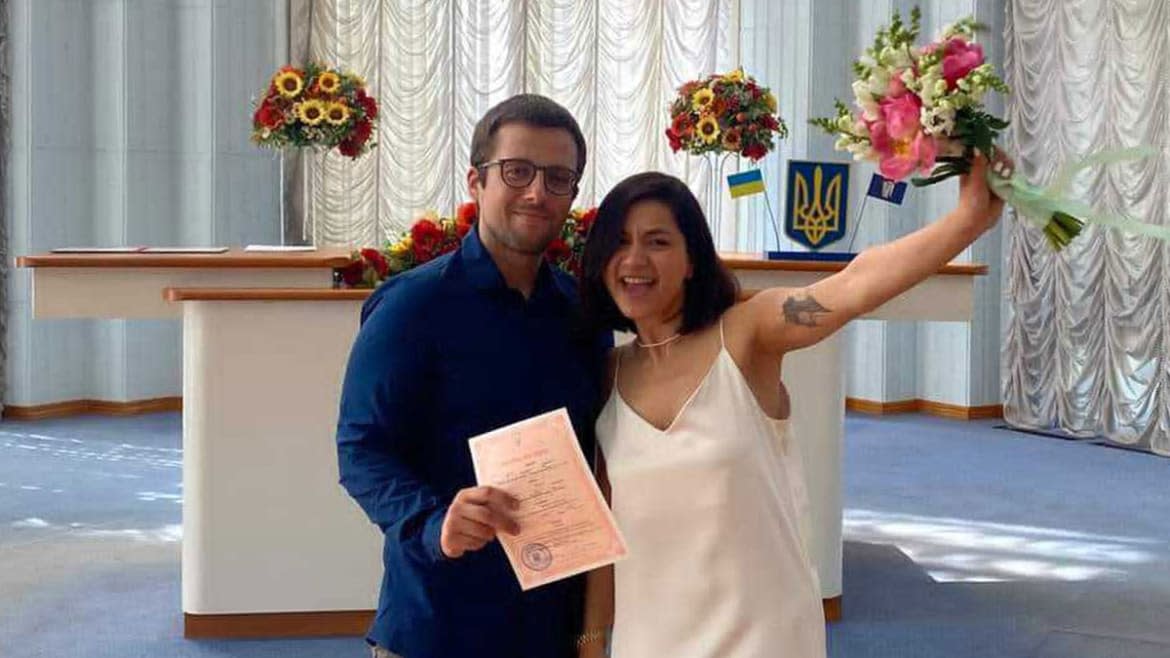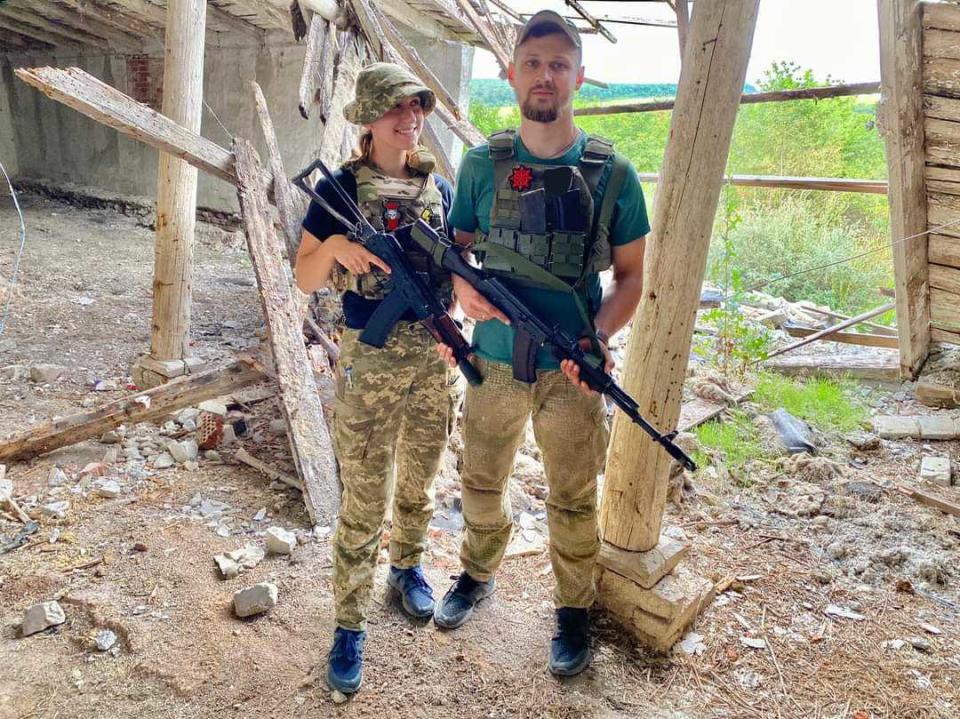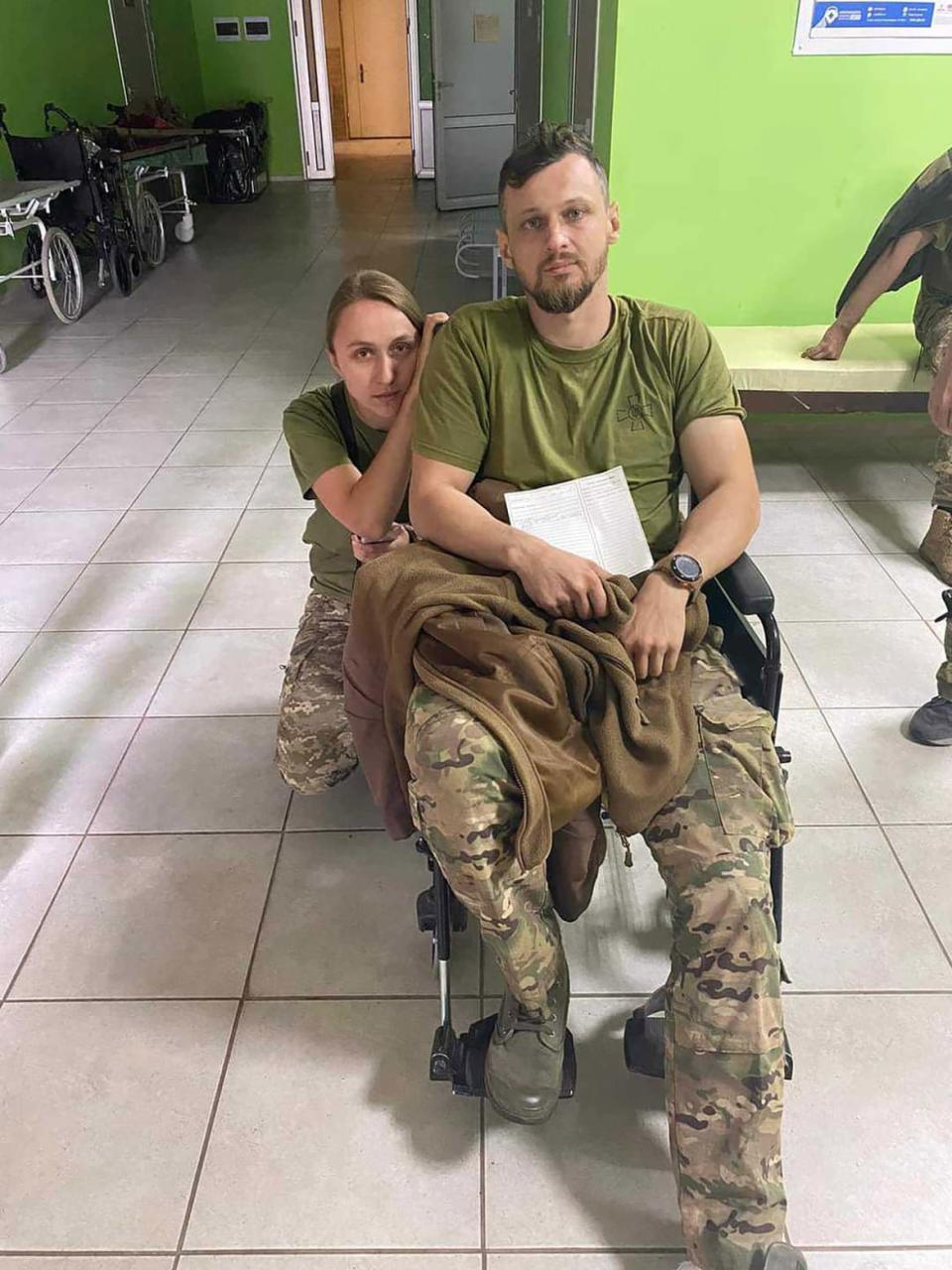A Groom’s Mad Dash From His Wedding to the Front Lines of Putin’s War

- Oops!Something went wrong.Please try again later.
KYIV, Ukraine—A proposal via text message, then a 15-minute shopping trip to pick out a ring, dress, and shoes. While her marriage in a local registry office wasn’t the fairytale wedding she dreamed of, 31-year-old Ukrainian Genia Aslanian says she couldn’t be happier to be married to the man she describes as a hero and the love of her life.
“We did the whole Vegas thing,” she told The Daily Beast, after her husband Anton was granted 10 days off from his position as an artillery officer on the front line of the war so they could wed. Anton, who, like most army officers, did not give his last name for security reasons, was a veteran of the war in Donbas that broke out after Vladimir Putin’s first invasion of Ukraine in 2014.
When Russia’s tanks rolled across borders all over the country in February, he was one of the first at the front line. After the war began, the government changed the law to allow couples to marry on the same day they became engaged. Genia and her husband are just one of nearly 10,000 couples who have gotten married in the first six months of the war, eight times as many as the same period last year.

Their relationship had started somewhere much flashier than the drab registry office. Their first date was a bike ride that started at 7 a.m. to Mezhyhirya, a decadent palace that belonged to exiled pro-Russian former President Viktor Yanukovych, who robbed billions from the country’s treasury to enrich himself and his cronies. It included a private zoo, spa complex, boxing gym and even a cryotherapy chamber. The gems in one chandelier had cost over a million euros, and under it was a piano that had cost twice that amount. It is now advertised as a “Museum of Corruption.”
If that opulence was a symbol of the old, corruption-ridden Ukraine, the sparse wedding hall where Genia and her husband got married on Sept. 3 is a symbol of a new egalitarian society where everyone works towards a common goal: the freedom of their country. They’d dated on and off for four years, but Genia said the war both gave them clarity. “We realized that what we wanted was just to be together, we can deal with our other issues later!” she told The Daily Beast.
Team Putin Threatens Maniacal Response to Bitter War Losses
Instead of a grand church, they were married in a humble wooden office with a few bouquets and a Ukrainian flag. She wore a simple white dress. Him, a blue dress shirt and gray dress pants. There were no guests at the wedding. Like so many couples here, they plan a big ceremony only “after the victory”—the period of happiness many Ukrainians believe will come after the war. But their marital bliss was cut short when he was called back to the front days after his wedding, when Ukraine began its lightning offensives first in Kherson and then the Kharkiv region.
In the last week, Ukrainians have once again shocked both Russians and Western observers with an extraordinary counteroffensive near Kharkiv, Ukraine’s second-largest city and a major target of Putin's invasion. With a thrust of tanks and armored vehicles supported by infantry and air defense, Ukraine’s forces liberated what President Zelensky said was over 8,000 square kilometers in less than a week. They took back major military and logistics hubs in the cities of Izyum and Kupyansk, cutting Russian supply lines to their already stalled offensive in the Donetsk region.
This was the most remarkable Ukrainian victory since they kicked Putin’s forces out of Kyiv oblast back in March, and has given the country renewed hope that they may one day be able to liberate all their occupied territory.
While the war has split millions of families, some have chosen to stay together. For Oksana Krasnova, the shock of the offensive was even more immediate—she had been on the front lines fighting alongside her husband when he was nearly killed earlier this month.
I’d first met them in a grubby trench barracks near Izyum in May of this year. At that point, they were horrendously outnumbered and outgunned, and we could see rockets fired by Russian artillery pound the fields and forests all around us.
The young couple—he was 35, she 26—had married in 2014 and worked as lawyers in Kyiv, but volunteered to join a National Guard unit in the first week of the war. He was originally from Crimea, but as a staunch Ukrainian patriot he had left the occupied Peninsula after the Russian annexation. For his troubles, the Russians charged him earlier this year with weapons offenses and sentenced him to 20 years in prison in absentia.
“[My husband] led an assault group to storm the Russian positions along the Izyum highway and he was wounded. A mine had blown up and he had been hit several times with shrapnel,” Oksana told The Daily Beast. “He is now in hospital and was operated on today. Part of the mine fragments were removed, but the other part can’t be removed for now.”
She is remarkably zen about nearly becoming a widow. “It is intense here, but we move forward,” were her last words to me before heading back to the front line.

Oksana Krasnova and her husband, Stas. The two fought on the frontlines of the war together before he was hit with shrapnel from a mine.
To an outside observer, life in Kyiv can now look remarkably normal. Most restaurants and cafes are back in business, the streets are emptied of checkpoints and fortifications, and most businesses have reopened. The occasional air raid siren or a Czech hedgehog tank trap discarded on the side of the road are the only signs of the war raging in much of the rest of the country. Yet all conversations quickly turn to the war, usually the worry for friends and loved ones on the front line or in occupied territories.
Despite Genia’s outwardly smiley appearance, it is quickly obvious that she is deeply worried. “He went offline for around five hours, and I nearly smashed one of my potted plants with anger and worry,” she said. Every missed call, extended period offline, or media report of Ukrainian casualties is an opportunity for her and all Ukrainians with loved ones on the front lines to fear the worst.
Genia and her husband often try to use dark humor to defuse the reality of what could happen. “We talked about under what conditions he and I would ever divorce, and what would happen if he got badly hurt. He said ‘if I only lose one leg, then I think we can still make things work. If I lose both, then you can leave me.’”
In Ukraine, these kinds of personal sacrifices and risks are seen as the price of freedom.
Get the Daily Beast's biggest scoops and scandals delivered right to your inbox. Sign up now.
Stay informed and gain unlimited access to the Daily Beast's unmatched reporting. Subscribe now.

